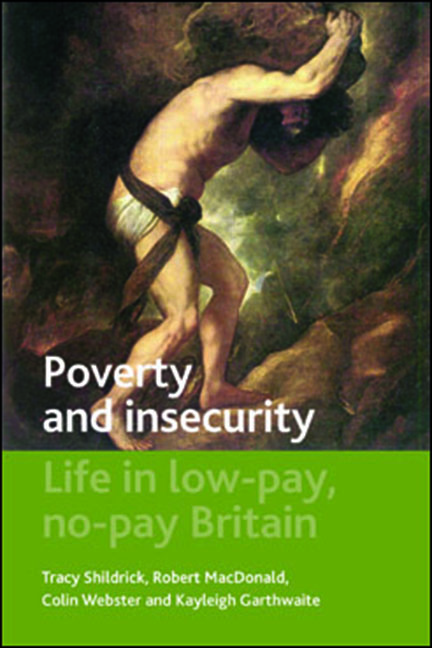Book contents
- Frontmatter
- Contents
- List of figures and boxes
- Acknowledgements
- 1 Introduction
- 2 Poor work, welfare and poverty
- 3 Researching the low-pay, no-pay cycle and recurrent poverty
- 4 The low-pay, no-pay cycle: the perspectives and practices of employers and ‘welfare to work’ agencies
- 5 The low-pay, no-pay cycle: its pattern and people's commitment to work
- 6 Searching for jobs: qualifications, support for the workless and the good and bad of informal social networks
- 7 Poor work: insecurity and churning in deindustrialised labour markets
- 8 ‘The ties that bind’: ill health and caring and their impact on the low-pay, no-pay cycle
- 9 Poverty and social insecurity
- 10 Conclusions
- References
- Index
10 - Conclusions
Published online by Cambridge University Press: 07 September 2022
- Frontmatter
- Contents
- List of figures and boxes
- Acknowledgements
- 1 Introduction
- 2 Poor work, welfare and poverty
- 3 Researching the low-pay, no-pay cycle and recurrent poverty
- 4 The low-pay, no-pay cycle: the perspectives and practices of employers and ‘welfare to work’ agencies
- 5 The low-pay, no-pay cycle: its pattern and people's commitment to work
- 6 Searching for jobs: qualifications, support for the workless and the good and bad of informal social networks
- 7 Poor work: insecurity and churning in deindustrialised labour markets
- 8 ‘The ties that bind’: ill health and caring and their impact on the low-pay, no-pay cycle
- 9 Poverty and social insecurity
- 10 Conclusions
- References
- Index
Summary
Introduction
So what have we learned about the low-pay, no-pay cycle and poverty? The first part of this chapter very briefly reviews the key findings that arose from the research reported in earlier chapters of the book. Following this we discuss how best we might explain and understand these experiences of labour market churning and poverty, situating our case study of Teesside's working poor within a broader, more global discussion of economic change, poverty and place. Following this we discuss the key policy conclusions that arose from the project. Insecurity of work and income (from employment and from welfare benefits) and the poverty that resulted were perhaps the dominant motifs that described the lives of the informants. In the next part of the chapter we enquire into what could be done in respect of tackling this insecurity and poverty. There is an emerging body of research that argues and practice that demonstrates that ‘bad’ jobs can be made ‘better’, and we discuss some of the strategies that could be employed to this end. In the third part of the chapter, we briefly discuss what is happening in respect of current welfare to work policy and poor work in the UK, demonstrating the disconnection between what, on the basis of our evidence, should be done and what is actually being done. The final part of the chapter – ‘the great myth and the great illogic’ – reflects critically on current policy and politics about the poor and the workless.
Key findings from the research
This book has been about how and why people become trapped in a long-term cycle of low-paid jobs and unemployment (the ‘low-pay, no-pay’ cycle). This is one of the first concerted studies in the area; relatively little is known about people's repeated movements into and out of poverty over the course of their lives and, in particular, how this recurrent poverty links to the low-pay, no-pay cycle and broader experiences of disadvantage. A key aim was to understand the dynamics of poverty and marginal work across the life course and, drawing on in-depth life history interviewees, to illustrate the consequences of this for the lives of individuals and their families.
- Type
- Chapter
- Information
- Poverty and InsecurityLife in Low-Pay, No-Pay Britain, pp. 193 - 224Publisher: Bristol University PressPrint publication year: 2012



